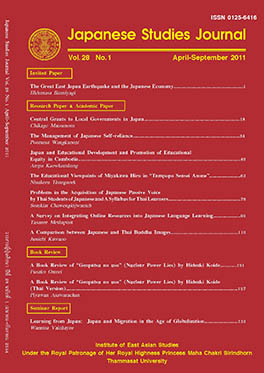เรียนรู้ประสบการณ์จากญี่ปุ่นสู่ไทย : ญี่ปุ่นกับการย้ายถิ่นของชาวต่างชาติในยุคโลกาภิวัฒน์
Keywords:
Multi-cultural society, Immigrant integration, Tabunka KyoseiAbstract
This is a report on a public lecture by Prof. Yamawaki Keizo, School of GlobalJapanese Studies, Meiji University, given on 3rd March 2011 at Thammasat University,co-organized by The Japan Foundation, Bangkok, in collaboration with the Institute of EastAsian Studies at Thammasat University. The global age of migration is fast becoming apermanent feature of Japanese life, impacting the country’s economic, social, and politicallandscape. Japan is moving towards becoming a multi-cultural society, with an increasingnumber of foreign residents and with a background of an ageing Japanese population andlow-birth rate. Historically, the Japanese government has not paid enough attention to foreignresidents and has avoided dealing with the issue of immigrant integration. In January 2009,the government set up an offi ce in charge of policy on resident foreigners in the CabinetOffi ce, aiming to support foreigners that have lost jobs during the current economic crisisand their children, and in August 2010, it created a guideline for measures regarding foreignresidents of Japanese descent. It remains to be seen if the government is ready to promoteimmigrant integration according to this guideline. Contrary to the government’s reluctance todeal with foreign residents, some local governments have acknowledged these individuals aspart of their community and gradual progress has been made since the 1970s.Downloads
Download data is not yet available.




